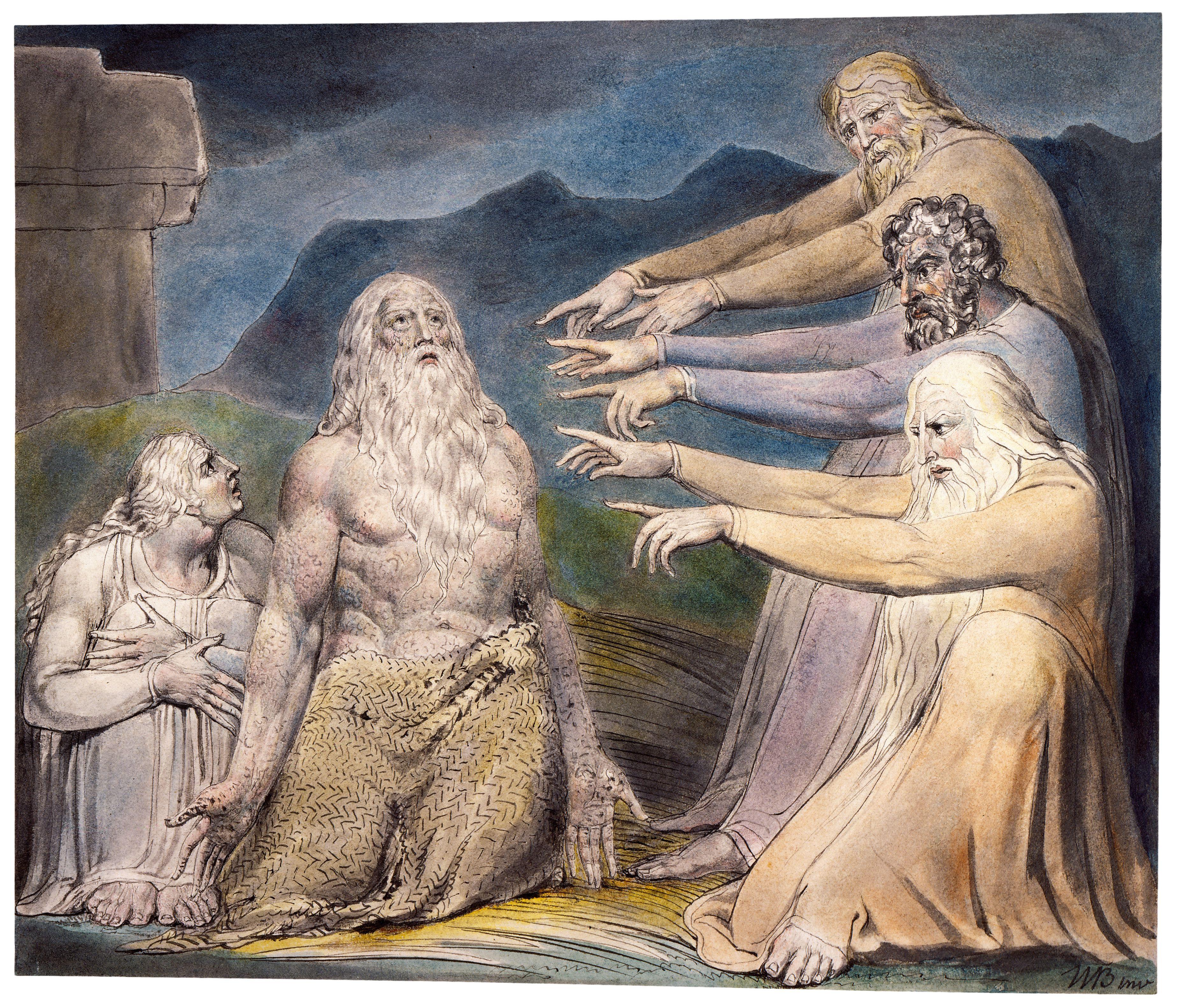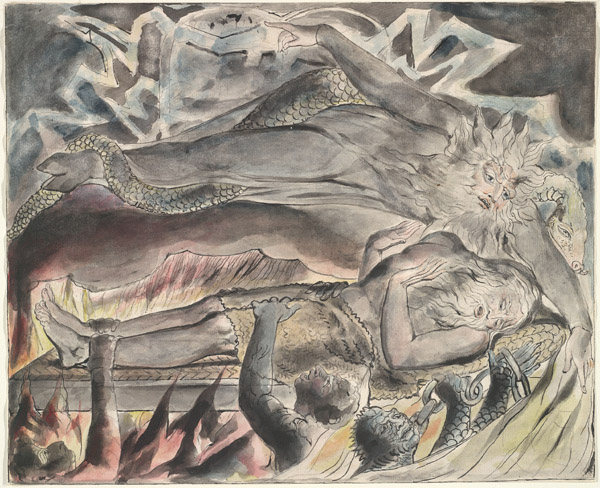 |
| Wikipedia Commons The vision of Eliphaz Butts Set of Illustrations for the Book of Job Page 9 |
"Shall mortal man be more just than God? shall a man be more pure
than his maker? Behold he putt no trust in his servants; and his
angels he charged with folly (Job 4:17-18)
Then a Spirit passed before my face; the hair of my flesh stood up (Job 4:15)"
Job 4
[1] Then Eliphaz the Temanite answered and said,
...
[12] Now a thing was secretly brought to me, and mine ear received a little thereof.
[13] In thoughts from the visions of the night, when deep sleep falleth on men,
[14] Fear came upon me, and trembling, which made all my bones to shake.
[15] Then a spirit passed before my face; the hair of my flesh stood up:
[16] It stood still, but I could not discern the form thereof: an image was before mine eyes, there was silence, and I heard a voice, saying,
[17] Shall mortal man be more just than God? shall a man be more pure than his maker?
[18] Behold, he put no trust in his servants; and his angels he charged with folly:]
[19] How much less in them that dwell in houses of clay, whose foundation is in the dust, which are crushed before the moth?
[20] They are destroyed from morning to evening: they perish for ever without any regarding it.
[21] Doth not their excellency which is in them go away? they die, even without wisdom.
Job 5
[17] Behold, happy is the man whom God correcteth: therefore despise not thou the chastening of the Almighty:
[18] For he maketh sore, and bindeth up: he woundeth, and his hands make whole.
Blake was familiar with visions. He relied on them to keep him in touch with the unseen world. Frightening visions were not alien to him. Gilchrist reported that Blake once ran out of his house upon seeing "a horrible grim figure, 'scaly, speckled, very awful,' stalking down stairs before him." The account in the Biblical Book of Job of Eliphaz's vision brought forth from Blake a picture of man being frightened by the appearance of God standing before him in a vivid dream.
Eliphaz, one of Job's three comforters, sought to intimidate Job by presenting his dream in which God appeared before him with a dreadful countenance. Eliphaz intimates that this angry, hostile God will turn his wrath on Job and destroy him because he had set himself to be more just and pure than God Himself. Job however knew of a God who corrected his servant and intended to make him whole when he had been chastened.
Book of Urizen, Plate 2, (E 70)
"PRELUDIUM TO THE BOOK OF URIZEN
Of the primeval Priests assum'd power,
When Eternals spurn'd back his religion;
And gave him a place in the north,
Obscure, shadowy, void, solitary.
Eternals I hear your call gladly,
Dictate swift winged words, & fear not
To unfold your dark visions of torment."
Milton, PLATE 26 [28], (E 122)
"These are the Sons of Los, & these the Labourers of the Vintage
Thou seest the gorgeous clothed Flies that dance & sport in summer
Upon the sunny brooks & meadows: every one the dance
Knows in its intricate mazes of delight artful to weave:
Each one to sound his instruments of music in the dance,
To touch each other & recede; to cross & change & return
These are the Children of Los; thou seest the Trees on mountains
The wind blows heavy, loud they thunder thro' the darksom sky
Uttering prophecies & speaking instructive words to the sons
Of men: These are the Sons of Los! These the Visions of Eternity
But we see only as it were the hem of their garments
When with our vegetable eyes we view these wond'rous Visions"
Jerusalem,Plate 25, (E 170)
"Injury the Lord heals but Vengeance cannot be healed:
As the Sons of Albion have done to Luvah: so they have in him
Done to the Divine Lord & Saviour, who suffers with those that suffer:
For not one sparrow can suffer, & the whole Universe not suffer also,
In all its Regions, & its Father & Saviour not pity and weep.
But Vengeance is the destroyer of Grace & Repentance in the bosom
Of the Injurer: in which the Divine Lamb is cruelly slain:
Descend O Lamb of God & take away the imputation of Sin
By the Creation of States & the deliverance of Individuals Evermore Amen
Thus wept they in Beulah over the Four Regions of Albion
But many doubted & despaird & imputed Sin & Righteousness
To Individuals & not to States, and these Slept in Ulro.
PLATE 26
SUCH VISIONS HAVE APPEARD TO ME
AS I MY ORDERD RACE HAVE RUN
JERUSALEM IS NAMED LIBERTY
AMONG THE SONS OF ALBION"






